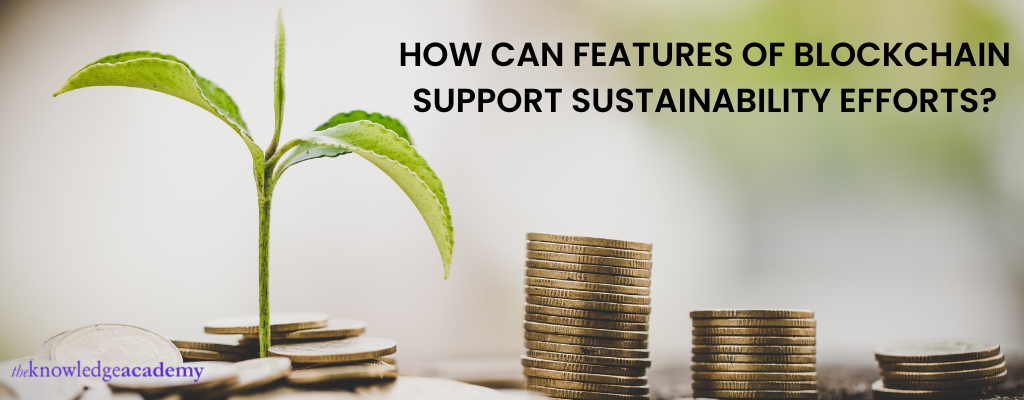We may not have the course you’re looking for. If you enquire or give us a call on +64 98874342 and speak to our training experts, we may still be able to help with your training requirements.
Training Outcomes Within Your Budget!
We ensure quality, budget-alignment, and timely delivery by our expert instructors.

Today, companies, regardless of the market of their operations, are focusing on making their operations Sustainable. This focus on reducing the adverse effects on the environment has given birth to different ways organisations can help protect the environment. According to a United Nations Sustainable Development report, more than 93% of the 250 largest companies in the world are reporting on Sustainability. Several factors contribute to Sustainability issues. Blockchain technology is becoming a means through which such problems can be resolved. It was developed as a means of sharing information and data without any interference. Despite Blockchain currently being used for trading different cryptocurrencies, the technology can also be instrumental in supporting sustainability efforts.
This blog introduces how Blockchain's different features can support Sustainability efforts.
Table of Contents
1) What is Blockchain?
2) Understanding Sustainability
3) How can features of Blockchain support Sustainability Efforts
4) Blockchain and Sustainability are perfect partners
5) Conclusion
Become an expert in Blockchain by joining Blockchain Training course.
What is Blockchain?

Blockchain technology is a system that records information in such a manner that it cannot be accessed and changed by anyone. It works on Distributed Ledger Technology (DLT). Using DLT means the data is recorded and distributed among the participating users. This ledger is almost impossible to hack into or gain access to, which makes Blockchain a highly secure means of sharing information. It enables trading in Cryptocurrencies such as Bitcoin (BTC) and Ethereum (ETH). But it has use cases way beyond Cryptocurrencies. It can be applied in business situations, such as using Smart Contracts to manage supply chains. Today, Blockchain is considered a means of enabling businesses and individuals to reduce their negative environmental impact.
Join the Blockchain Training Course to learn technological concepts of Cryptography and Bitcoin.
Understanding Sustainability

Sustainability is a concept that encourages businesses to carry out their operations, keeping in mind the impact it might have on the natural environment. It teaches companies to think about the broader impact on the planet and society instead of just focusing on profits. In essence, Sustainability means meeting current needs without compromising the ability of future generations to meet their needs.
With Business Sustainability Masterclass understand importance of ethics and corporate governance.
How can features of Blockchain support Sustainability Efforts?
Blockchain has been the most extensive technological development in the last decade. Although it was developed as a means of sharing information, it is currently being used to trade cryptocurrencies. However, Blockchain has many more use cases, such as helping to protect the environment. Its power and efficiency have the potential to reduce overall energy consumption.
There are several features with which Blockchain can provide extensive support to protecting the environment. Technology features can help promote Sustainability by giving businesses access to data contained within the Blockchain. Companies can use this Blockchain-powered data to identify issues in different aspects of business operations and then develop an effective solution.
Learn automatically managed Blockchain. Join Amazon Managed Blockchain Training – today!
Below are some of the features of Blockchain that support Sustainability Efforts.
Decentralised
The feature of decentralised control can be helpful with the overall goal of Sustainability. Companies can improve the efficiency of their systems and processes or even create entirely new ones based on Blockchain. In terms of Sustainability, Blockchain will empower organisations to remove redundancies by decentralising the decision-making process. The business decision-making process is very long and complex, resulting in wasted resources. Blockchain technology can pave the way to make the decision-making process decentralised and also limit wastage. With Blockchain, no one can gain control over the network and take undue advantage of the system. In addition, using Blockchain will also ensure seamless and efficient business transactions, which in turn will significantly reduce waste and inefficiencies. This way, Blockchain can extend support to Sustainability efforts.
Build resilient and transparent supply chains
One of the Sustainable Development Goals (SDGs) targets is to build resilient infrastructure that promotes sustainable and inclusive industrialisation. With the use of Blockchain technology, achieving this target is more accessible. Businesses and individuals have a growing dependence on Blockchain to monitor their supply chains. Through Blockchain, such systems can be created that help in sourcing and pricing the raw materials and others. AB InBev used Blockchain technology in Zambia to create transparency in pricing locally sourced crops such as Cassava.
Use of Smart Contracts
The Smart Contract is another feature that can support Sustainability efforts. In this regard, businesses can form Smart Contracts with their suppliers. These contracts will indicate that when the raw materials go below a certain level, resupplying orders will be issued automatically to the supplier. This is environmentally friendly because it will help eliminate waste and ensure enough raw materials. Blockchain networks are required for developing and storing such contracts.
Transparency on Social Issues
Another essential feature of Blockchain technology is that it provides transparency on various social issues. Here the inherent attribute of Blockchain – access to information by all participating users – can be used. Companies can input data on the network, which then can be accessed by all the users within the network. Companies often do not share information regarding their Sustainability practices and policies with the stakeholders such as the general public. With Blockchain technology, businesses can share their contribution towards Sustainability efforts. This way, the firm can earn people's trust and increase its efforts to enhance the quality of its operations to make them more environmentally friendly. The data stored in Blockchain is immutable and decentralised. This means the information stored in the Blockchain cannot be changed and can be accessed by anyone on the network.
Preparing for a Job Interview? Check out our Blockchain Interview Questions!
Blockchain promotes Green Finance
Another way Blockchain can support initiatives taken for Sustainability is by promoting Green Finance. It can extend support to the various programs for protecting the environment by enabling crowdfunding and peer-to-peer financial transactions. These initiatives can be leveraged as a means to help in making the world a better place with the help of Blockchain technology. In this regard, Blockchain-enabled tokenisation and finance can be a means to achieve a greener and more sustainable future. There need to be more public budgets. Blockchain technology can attract increased investments towards Green Finance and other such Green Projects. Using such sources of funds will attract significant investments in Green Finance, enabling Blockchain technology to contribute to efforts to save the environment.
Help in recycling programs
Blockchain technology can also be used to support recycling. It can significantly help in protecting the environment. Companies can use Blockchain to offer financial incentives in the form of tokens and cryptocurrencies to the people who contribute to recycling. Cryptographic tokens can be given to people in exchange for depositing recyclable materials like plastic bottles, containers, and others. Blockchain technology can be used to understand the harm caused by companies and individuals to the environment. IBM's Plastic Bank is an example in this regard. It offers cash in exchange for plastic by opening plastic collection points in many third-world countries worldwide.
Understand sustainable development principles with ISO 20121 Event Sustainability Management System Training.
Blockchain and Sustainability are perfect partners

Several environment-friendly projects are gaining popularity and attracting investors. The role of Blockchain technology is becoming prominent in helping to protect the environment. Businesses are attempting to determine ways to reduce their carbon footprint by using Blockchains and enhancing their Sustainability efforts. Blockchain can be a practical approach to improve business Sustainability practices and policies. However, significant changes and updates will have to be made in the operations of businesses. They will need to adopt and use digital infrastructure so that the impact of business operations on the environment can be managed to reduce the harmful effects.
In addition, businesses will also need to adopt a value chain-dependent outlook to implement Blockchain-powered solutions effectively. This would mean that organisations will need to analyse the value generated from their operations for the business and society. The company can improve its supply chain and manufacturing processes if the results are helpful for both parties.
Conclusion
Blockchain has been a significant technological development in recent years. It possesses the power to disrupt many industries and the operations of businesses at different levels. Blockchain technology has become a tool that can contribute towards initiatives for protecting the environment and making the world a better place. In this blog, we examined the features of Blockchain and how they can support environmental protection programs.
Frequently Asked Questions
Upcoming Business Skills Resources Batches & Dates
Date
 Blockchain Training Course
Blockchain Training Course
Thu 16th Jan 2025
Thu 6th Mar 2025
Thu 22nd May 2025
Thu 24th Jul 2025
Thu 4th Sep 2025
Thu 20th Nov 2025
Thu 11th Dec 2025







 Top Rated Course
Top Rated Course



 If you wish to make any changes to your course, please
If you wish to make any changes to your course, please


